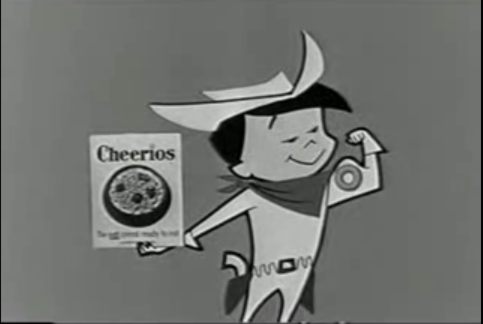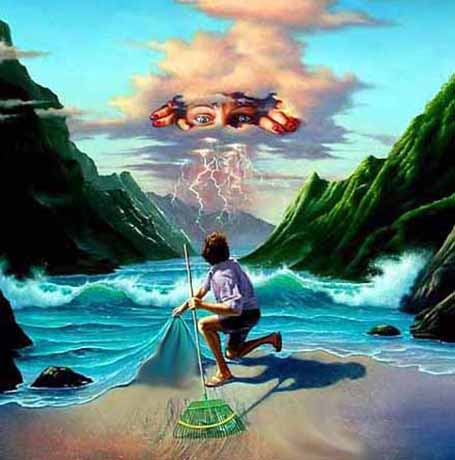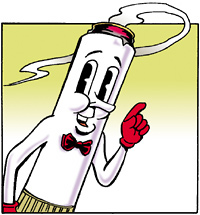My father was a distant figure as I was growing up. He worked hard and every day, putting in long hours. First at the Dictagraph plant, then at the bicycle shop he started, and then as a salesman who traveled around the state. But he was distant even when at home.
He was, to us, the grumpy man who showed up around suppertime. He was stern and non-talkative. He was the one to be dreaded ("Just wait till your father gets home!"), to be feared. He seemed to have no bright side. He didn't play catch or teach me to ride a bicycle (only how they work and how to work on them).
He was a giant to me, a tall man (6'4") with a long stride who rarely waited for me. On the rare occasion when he would lift me onto his shoulders, it seemed like I could see for miles. A good dad to have at a parade.
We never talked about anything unless I was getting a lecture or being given instructions about a chore I was to do. I had no idea what his dreams were or how he viewed the world. But he was never wrong about anything, it seemed.
The "fun" times were when he would take us to Carvel for a treat. This was rare, maybe once a month in summer and quite an irregular event at that. Wherever we went as a family, we kids were to be behaved and quiet. We weren't, I suppose, because I do recall an angry look and a warning at times. That was plenty to shut us down immediately.
As I got older and more independent, we drifted even further apart. I was not alone, he and my brother were also estranged. Only my sister acted like he was a wonderful dad or seemed to feel close to him. She seemed to get a kick out of making him feel uncomfortable. He didn't like to be hugged.
My parents were close. As I grew older, I realized how devoted they were to each other. I was close to my mother but my father was a stranger to me. My mother once told me that he loved us but that he was uncomfortable around children. That once they learned to talk, once they learned the word "no", he was at a loss on how to deal with them. This seemed odd since "no" was not a word to use in response to any order from him. There were no requests, only orders, even if phrased as a question. If he asked, "Would you mow the lawn tomorrow?", it really meant "You
will mow the lawn tomorrow!"
As a result, I never learned to relax around him. Even as an adult with a wife and son, he intimidated me. I never felt I measured up. We still never discussed things. The few times we tried deteriorated quickly. You did not get to have a valid opinion that opposed his. He didn't argue, just shut down the discussion at the point you disagreed.
Most of my adult life was spent far away from the rest of the family. I lived on the other coast much of the time. I rarely visited. When I did, I spent more time around my mother than anyone else. Only my mother came to see us while I was living in San Diego.
When my first marriage broke up and I transferred out to West Palm Beach, I borrowed some money from my father and mother to put down on a house. When I transferred back, I sold the house and paid him back with 10% interest. He tried to refuse the interest but I insisted. I paid my mother's half back in two payments over several years.
It was only in his later years, his 70s, that I tried to get to know him better, to chat with him. We had similar interests in photography and in knowing how things worked. We were both cynical about the world and politics. But we still had a strained, distant, relationship.
Faye and I had finally moved back into the same area in which my parents lived, though still some 35 miles away. I began to take them to dinner every couple of weeks or so. When his health began to get bad, I would come down to mow the lawn or do some chores which needed to be done. My father and I began to talk a little more.
I still never learned what his dreams might have been, what his joys and disappointments were. But I began to understand him just a little better. He became less of a mystery to me. But still remained a a stranger, distant and a little grumpy.
I was very surprised when he took me aside one day and asked me to promise him something. He asked me to look after my mother if anything happened to him. For him to bring this up meant that he knew something would, possibly soon. I, of course, immediately promised I would... that it went without saying that I would see to Mom's needs. And to his, if that ever became necessary.
I asked him why he brought this up at this time but he wouldn't talk. He got his promise, the conversation was over.
Over the next three years, many changes came about. They could no longer care for their home. My mother's Alzheimer's grew worse and my father less able to cope with it all. His own physical health was deteriorating. His heart was failing, he was growing weaker all the time. He to have a Pacemaker put in but it only postponed the inevitable.They had to move out of their home of 35 years and into assisted living.
This was a terrible blow to my father. This strong, independent, man was reduced to near helplessness. He had "lost" his home, he could no longer take care of his wife, he must depend on others for the first time since he was a child. It crushed his spirit.
For the next two years, he moped. He drifted. And he complained. Not about his care, not about the people who watched over him. But about still being alive. My mother said it best one day...
"He just sits around, waiting to die."
And, then, one day I got a call from my sister. My father had been rushed to the hospital, I needed to come down right away. When I arrived at the hospital, I found him on a respirator. The ugly monstrosity forcing air into lungs that did not want it. He groaned involuntarily with each breath, it seemed. He was unconscious, unable to breathe on his own. In spite of his DNR order, the EMTs had resuscitated him and the doctors were obliged to put him on the respirator when he arrived.
I showed the doctor my medical Power of Attorney, I explained about the DNR. He was sympathetic. He knew Dad would not make it but he advised that I should leave him as he was for 24 hours. That maybe, just maybe, he would start breathing on his own. I should return the next day and maybe I wouldn't have a decision to make.
He was wrong. I had to sign the order to remove him from the respirator. It was the hardest thing I have ever had to do. Three days later, Dad passed away quietly in his bed in the Hospice ward on the 4th floor.
I never really got to know him.


























